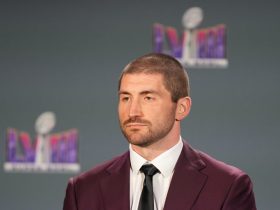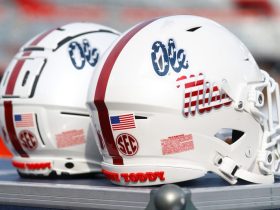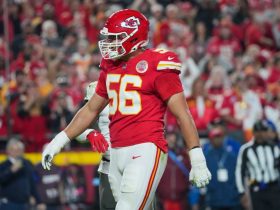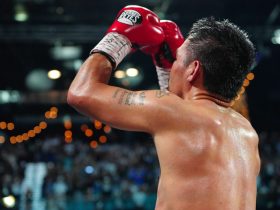The reason Brittney Griner is the sports story of the year, isn’t solely because of her bravery while being ‘wrongfully detained’ in Russia. It isn’t just that she became a symbol of strength that unified large swaths of the sports world and beyond. It isn’t just because of the love story that is her wife, Cherelle, who fought relentlessly to free her. It isn’t only because of the success of American diplomacy that saw her as a human being and worked tirelessly to secure her release.
It is all those things but perhaps one of the biggest reasons Griner is the sports story of the year is because of what she still represents: the gender pay gap.
The joy of Griner being home has overshadowed why she was in Russia in the first place.
‘We go over there to supplement our incomes,’ she said, ‘and quite frankly, we go over there to maintain our game.’
The pay gap in America between men and women is stark, as NPR notes, with annual earnings in 2020 for women just 82.3 percent of what men earned. It’s even worse in the WNBA. The NBA base salary is over $5 million while the base salary in the WNBA is approximately $120,000. The WNBA says its top players can earn more than $700,000 with base salary, bonuses and other compensation.
The WNBA season is shorter at 36 games (the NBA has an 82-game season) but that type of disparity is still grotesque.
Making more money, and being able to play more games, thus keeping her skills sharp in the off-season, is at the root of why Griner went to Russia. If you think she shouldn’t have gone because of the danger, or shouldn’t have brought vape cartridges into the country, you have to understand that the perceived threat that Russia presented for foreigners wasn’t always the way it is now.
In other words, Griner did what American business people have done in Russia for decades. She saw the possibility of making extra money, weighed the risk, and decided that risk was low. If Griner was making fairer wages, she wouldn’t have needed to take that chance.
Firestone has dedicated his life to fighting government corruption, particularly involving Vladamir Putin, and he is the perfect person to ask if there was a lesson from Griner’s detention and subsequent release. His response is one of the most thoughtful and heartfelt of any quote you will ever read about the entire Griner ordeal.
‘Lesson? I’m not sure there is one. Or perhaps there are many,’ Firestone told USA TODAY Sports. ‘I worked in Russia for 18 years and I used to say the great thing about Russia is that the perceived risk is so much higher than the actual risk. And so you get paid incredibly well without really risking anything. But I was wrong. My first law partner was shot and killed, my second was imprisoned, tortured and killed, and I ended up running for my life, leaving everything I had worked for behind.
‘Brittney just wanted to play basketball. She was offered a great deal, seemingly risk free, and ended up in prison for 10 months just so a dictator could free an arms trafficker.
‘I think that says a lot about what Russia has become under Mr. Putin. That we made this trade says a lot about what America has remained. We put love over hate, or fear, and did the right thing. I’m glad she is home, and I’m proud she is going to fight for Paul Whelan’s release. She’s really special, and not just inside the world of sports.’
This story is the most important sports story of the year because Griner is so many things: hero, survivor, Olympian, professional athlete, wife, and an American.
But she is something else. She’s a symbol of a problem that’s existed for centuries and still does to this day.
In some ways the Griner story is over but when it comes to fighting gender income inequality, it’s only just beginning.






